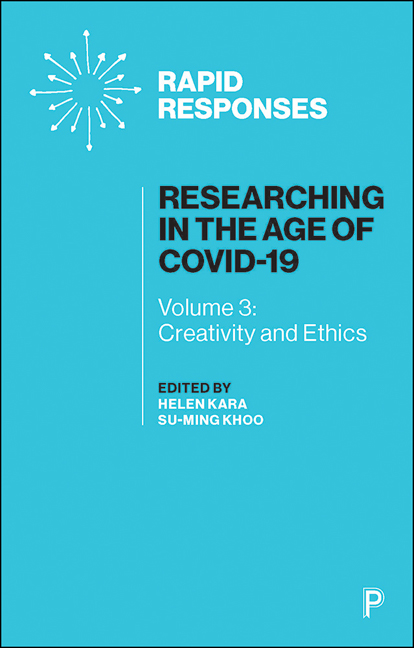5 - Conceptualizing Research Ethics in Response to COVID-19: Moral and Economic Contradictions
Published online by Cambridge University Press: 23 March 2021
Summary
Introduction
This chapter provides a conceptual approach to social science research ethics emerging during the COVID-19 pandemic, examining parallel issues which arose during the crisis around morality and economics. This juxtaposition between these contradictory concepts poses a number of challenges for researchers and research ethics across all disciplines. At a time when social research is recognized as essential to overcoming and learning from the global crisis, one question faced by researchers is how to navigate their moral obligations while conducting impactful and economically sustainable research. While this may be a consideration of research conducted at any time, it is particularly relevant during the COVID-19 crisis. It mirrors the narrative around the entire pandemic – where do our moral obligations end and our economic ones begin? How can we continue to ensure the health and safety of a global population while ensuring the global economy does not collapse? Where do we draw the line in terms of prioritizing particular populations over others? All these questions are not only driving the morality versus economics debate with regards to responses to the pandemic but also specifically in the case of conducting research during a pandemic.
This chapter provides insight into the particular challenges faced by researchers during the pandemic using a conceptual literature review of academic literature and online material. It aims to provide a resource to encourage and develop thinking about research ethics during particularly difficult global situations. The chapter draws on the theoretical debate between utilitarianism and deontology to further this examination and provides a framework from which to view research ethics during a period of flux, where the line dividing utilitarianism and deontology is fluid, ever-changing and dynamic.
This chapter emerged from immersion in the COVID-19 crisis as a researcher in international development and considering my own position in relation to research ethics. As I considered the impact of the crisis on research practice and ethics, I was struck by the way questions around research ethics mirrored the global narrative. This chapter is the culmination of a review of academic and online literature. The literature was found using academic databases (JSTOR, Project Muse, ProQuest, Google Scholar, Academia and ResearchGate) and used the following search terms: COVID, coronavirus, economics, economic crisis, ethics, moral, morality, ethical responsibility, deontology and utilitarianism in different combinations.
- Type
- Chapter
- Information
- Researching in the Age of COVID-19Volume III: Creativity and Ethics, pp. 51 - 60Publisher: Bristol University PressPrint publication year: 2020



